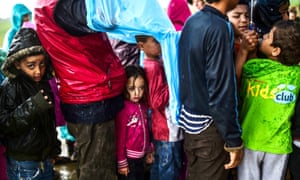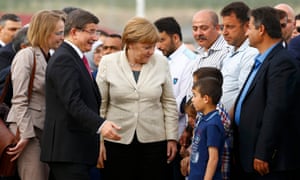
By Patrick Kingsley
Link
In 1938, representatives from 32 western states gathered in the pretty resort town of Evian, southern France. Evian is now famous for its water, but back then, the delegates had something else on their minds. They were there to discuss whether to admit a growing number of Jewish refugees, fleeing persecution in Germany and Austria. After several days of negotiations, most countries, including Britain, decided to do nothing.
On Monday, I was reminded of the Evian conference when British MPs voted against welcoming just 600 child refugees a year over the next half-decade. The two moments are not exactly comparable. History doesn’t necessarily repeat itself. But it does echo, and it does remind us of the consequences of ethical failure. Looking back at their inaction at Evian, delegates could claim they were unaware of what was to come. In 2016, we no longer have that excuse.
Nevertheless, both in Britain and across Europe and America, we currently seem keen to forget the lessons of the past. In Britain, many of those MPs who voted against admitting a few thousand refugees are also campaigning to unravel a mechanism – the European Union – that was created, at least in part, to heal the divisions that tore apart the continent during the first and second world wars.
Across Europe, leaders recently ripped up the 1951 refugee convention – a landmark document partly inspired by the failures of people such as the Evian delegates – in order to justify deporting Syrians back to Turkey, a country where most can’t work legally, despite recent legislative changes; where some have allegedly been deported back to Syria; and still more have been shot at the border.
Emboldened by this, the Italian and German governments have since joined David Cameron in calling for refugees to be sent back to Libya, a war zone where – in a startling display of cognitive dissonance – some of the same governments are also mulling a military intervention. Where many migrants work in conditions tantamount to slavery. Where three separate governments are vying for control. And where Isis runs part of the coastline.
In Greece, Europe’s leaders have forced the bankrupt government to lock up all arriving asylum seekers – and then reneged on a promise to help care for them, or move them to better-resourced countries elsewhere on the continent. The result is a dire situation on the Greek islands, where the world’s richest continent has contrived to jail babies, and then deny them access to adequate amounts of milk formula.
In Denmark, asylum seekers are forced to hand over valuables to pay for their stay, and volunteers have been prosecuted as smugglers for giving them lifts. In America, where boatloads of refugees were turned away from US ports in the 30s, more than 30 governors have refused to accept Muslim refugees. Some called for an outright ban on anyone fleeing a war that is ironically the partial result of catastrophic mistakes in American foreign policy over the past two decades.
On Saturday afternoon, I came face to face with a similar kind of wilful blindness, close to Turkey’s border with Syria. Angela Merkel, the German chancellor, and Donald Tusk, the European council president, were visiting a Syrian refugee camp. In exchange for Turkey readmitting asylum seekers deported back from Europe, Europe is giving Turkey several billion euros to help care for the Syrians now stranded on its soil. Merkel and Tusk were at the camp to highlight the first beneficiaries of this cash, and to show that Turkey is an appropriate place to house refugees – that life inTurkey can be every bit as nice as life in Europe.
Merkel has shown extraordinary ethical leadership over the past year, but in this case she was participating in a charade. The camp she visited was pleasant enough – but it does not represent the lived reality of most Syrians in Turkey, 90% of whom live in urban poverty outside the camps. To really understand the limbo in which they are now trapped, Merkel should have visited the sweatshops on the other side of town, where thousands of Syrian children work 12-hour days to support their families. Or, even better, she might have peered over the border wall to the south, to watch Turkish soldiers shoot at Syrians as they try to escape the battlegrounds of northern Syria.
Instead, Merkel visited a sanitised refugee camp for 45 minutes. Most camp residents were ordered out of sight for the duration of her visit, leaving Merkel to spend roughly 20 seconds shaking hands with a line of just five Syrian men. It was a PR stunt stage-managed for the benefit of a hundred waiting journalists – a visual metaphor for the see-no-evil excuses that Europe has used to justify deporting refugees back to Turkey. “Today, Turkey is the best example for the whole world for how we should treat refugees,” Tusk told us later in the day. “Nobody should lecture Turkey on what to do.”
Europe’s abdication of responsibility is usually justified in the name of cultural superiority. Invoking a religion named after a man who was at times both a refugee and a migrant, several European politicians have used Christianity to justify their rejection of refugees. “Is it not worrying in itself that European Christianity is now barely able to keep Europe Christian?” asks Hungary’s prime minister, Viktor Orbán. “There is no alternative, and we have no option but to defend our borders.”
But citing religion and morality shouldn’t obscure the truth. The pope aside, by turning a blind eye to reality, by forgetting the lessons of the past, and by tearing up the post-war settlement, Europe risks an ethical catastrophe that would return us to the moral collapse of the 1930s. With the far right on the rise across Europe, it has been argued that deporting refugees back to places such as Turkey and Libya will save the continent from relapsing into the extremism of the interwar years. But I wonder if the opposite is true – if instead of averting a lurch to the right, it in fact takes us one step closer.
The Evian conference may have happened long ago, but we can still learn its lessons. It reminds us, just as Hugo Rifkind wrote in a moving essay about the Holocaust last year, that “we, as humans, balance on the very lip of the unspeakable; always far closer to toppling than we might wish to admit. All of us, everywhere, all the time.”
A few hours before Merkel arrived at the refugee camp on Saturday, I was on the other side of town at a sweatshop full of Syrians making shoes. The manager, Abu Shihab, hadn’t heard of anything like the Evian conference, and he didn’t mention the Holocaust. But he knows about Europe, and its reputation for morality. And he thinks it’s now undeserved.
“Cats and dogs in Germany can get pet passports – and they’re closing the borders to humans?” he asked. “History will document this.”
• The New Odyssey by Patrick Kingsley (Guardian Faber, £14.99) is published on 5 May. Pre-order your copy for £9.99 from bookshop.theguardian.com or call 0330 333 6846.


No comments:
Post a Comment